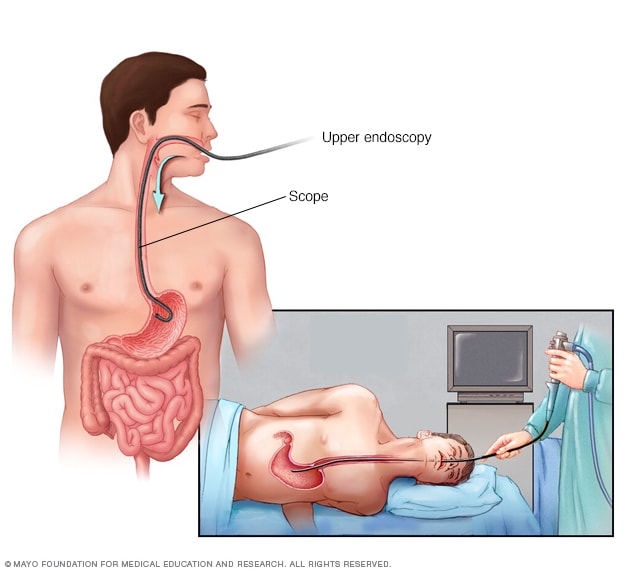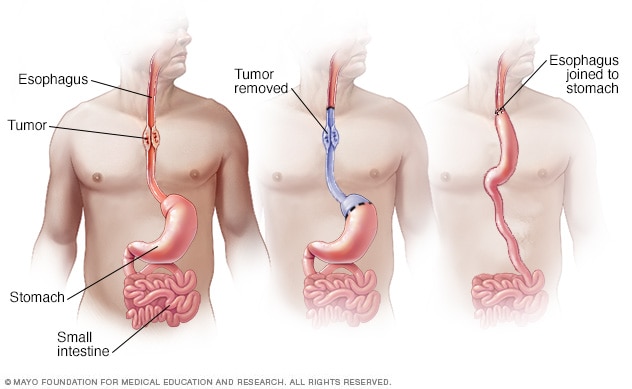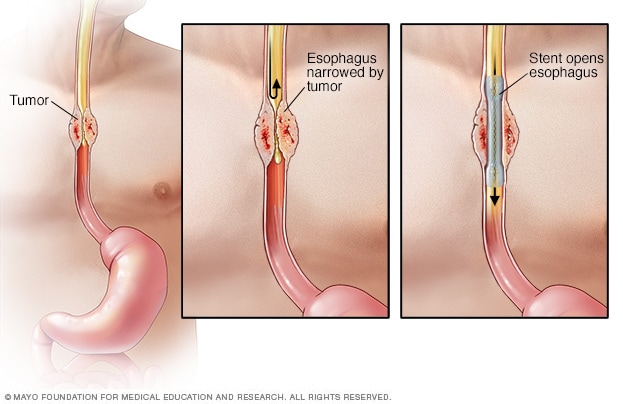Diagnosis
Endoscopy

Endoscopy
During an upper endoscopy, a healthcare professional inserts a thin, flexible tube equipped with a light and camera down the throat and into the esophagus. The tiny camera provides a view of the esophagus, the stomach and the beginning of the small intestine, called the duodenum.
Esophageal cancer diagnosis often begins with imaging tests to look at the esophagus. A thin, flexible tube with a camera may be passed down the throat to see the esophagus. A sample of tissue may be taken for lab testing.
Barium swallow study
A barium swallow study is a test that uses X-rays to look at the digestive system. It can show changes in the esophagus, such as a growth that could be cancerous. Before the test, you drink a white liquid called barium. The barium coats your esophagus and makes it easier to see on X-rays. If anything worrying is found on the barium swallow study, your healthcare team might recommend having an endoscopy to check it out.
Upper endoscopy
Upper endoscopy is a test to look at the upper digestive system. It uses a long, flexible tube with a camera at the end, called an endoscope, to see inside the body. To see inside the esophagus, a healthcare professional passes the endoscope down the throat and into the esophagus. The health professional looks for signs of cancer.
Biopsy
A biopsy is a procedure to remove a sample of tissue for testing in a lab. To get the tissue sample, a healthcare professional passes special cutting tools through an endoscope. The health professional uses the tools to remove a very small amount of tissue from the inside of the esophagus. The tissue sample is sent to a lab to look for cancer cells.
Determining the extent of the cancer
After an esophageal cancer diagnosis, you may have other tests to see if the cancer has spread. These tests help your healthcare team find out the extent of your cancer, called the stage. Cancer staging tests often involve imaging tests. The tests might look for signs of cancer in your lymph nodes or in other parts of your body. Your healthcare team uses the cancer staging test results to help create your treatment plan.
Imaging tests may include bronchoscopy, endoscopic ultrasound, CT, MRI and positron emission tomography scans, also called PET scans. Not every test is right for every person. Talk with your healthcare professional about which tests you will need.
The stages of esophageal cancer range from 0 to 4. A stage 0 esophageal cancer is small and only on the inside surface of the esophagus. As the cancer gets larger and grows deeper into the esophagus, the stages get higher. A stage 4 esophageal cancer has grown beyond the esophagus or has spread to the lymph nodes or other parts of the body.
More Information
Treatment
Treatment for small esophageal cancers usually begins with surgery to remove the cancer. If the cancer grows larger or spreads to other parts of the body, treatment might start with chemotherapy and radiation instead. Your healthcare team considers many factors when creating a treatment plan. These factors include your overall health, the type and stage of your cancer, and your preferences.
Surgery
Esophageal cancer surgery

Esophageal cancer surgery
One operation used to treat esophageal cancer is esophagectomy. During esophagectomy, the surgeon removes the part of the esophagus that contains the cancerous tumor. The surgeon also may remove some of the upper part of the stomach and nearby lymph nodes. The remaining esophagus is reconnected to the stomach. Usually this is done by pulling the stomach up to meet the remaining esophagus.
Surgery to remove the cancer can be used alone or in combination with other treatments.
Procedures used for esophageal cancer may include:
- Removing the cancer from the inside of the esophagus. Endoscopic resection is a procedure to remove the cancer and some of the healthy tissue around it. The procedure is done through a long, flexible tube, called an endoscope. The tube goes down the throat and into the esophagus. Special tools are passed through the endoscope to remove the cancer. This procedure might be an option if the cancer is very small and hasn't spread.
- Removing the cancer and part of the esophagus. Esophagectomy is surgery to remove part of the esophagus. During esophagectomy, the surgeon removes the part of the esophagus that contains the cancer and some nearby lymph nodes. The surgeon also may remove some of the upper part of the stomach. When the surgery involves removing some of the esophagus and some of the stomach it's called an esophagogastrectomy. The remaining esophagus is reconnected to the stomach. Usually this is done by pulling the stomach up to meet the remaining esophagus. If necessary, part of the colon is used to help join the two.
Esophageal cancer surgery carries a risk of serious complications. These complications may include infection and bleeding. There's also a risk of leakage from the area where the remaining esophagus is reattached to the stomach.
Surgery to remove the esophagus can be performed as an open procedure using large incisions. Surgery also may be done laparoscopically where special surgical tools are inserted through several small incisions in the skin. How your surgery is performed depends on your individual situation and how your surgeon wants to approach it.
Chemotherapy
Chemotherapy treats cancer with strong medicines. Chemotherapy medicines are typically used before or after surgery in people with esophageal cancer. Chemotherapy can be combined with radiation therapy.
In people with advanced cancer that has spread beyond the esophagus, chemotherapy may be used alone to help relieve symptoms caused by the cancer.
Chemotherapy side effects depend on which medicines you receive. Common side effects include fatigue, nausea and vomiting, diarrhea, and loss of appetite.
Radiation therapy
Radiation therapy treats cancer with powerful energy beams. The energy can come from X-rays, protons or other sources. For esophageal cancer, radiation therapy is most often done with a procedure called external beam radiation. During this treatment, you lie on a table while a machine moves around you. The machine directs radiation to precise points on your body. Radiation also can be placed inside your body near the cancer. This kind of radiation therapy, called brachytherapy, is less common.
Radiation therapy is often combined with chemotherapy in people with esophageal cancer. Radiation therapy also is used to relieve complications of advanced esophageal cancer. This may include treating a cancer that grows large enough to stop food from passing to your stomach.
Side effects of radiation to the esophagus include sunburn-like skin reactions, painful or difficult swallowing, and damage to nearby organs, such as the lungs and heart.
Combined chemotherapy and radiation
Combining chemotherapy and radiation therapy may enhance the effectiveness of each treatment. Combined chemotherapy and radiation may be the only treatment you receive, or combined therapy can be used before surgery. But combining chemotherapy and radiation treatments increases the likelihood and severity of side effects.
Targeted drug therapy
Targeted therapy for cancer is a treatment that uses medicines that attack specific chemicals in cancer cells. By blocking these chemicals, targeted treatments can cause cancer cells to die.
For esophageal cancer, targeted therapy may be combined with chemotherapy for advanced cancers that can't be removed with surgery or for cancers that come back after treatment.
Some targeted therapies only work in people whose cancer cells have certain DNA changes. Your cancer cells may be tested in a lab to see if these medicines might help you.
Immunotherapy
Immunotherapy for cancer is a treatment with medicine that helps the body's immune system kill cancer cells. The immune system fights off diseases by attacking germs and other cells that shouldn't be in the body. Cancer cells survive by hiding from the immune system. Immunotherapy helps the immune system cells find and kill the cancer cells.
For esophageal cancer, immunotherapy is sometimes used before or after surgery. It also may be used for advanced cancers that can't be removed with surgery or for cancers that come back after treatment.
Treatments for complications
Esophageal stent

Esophageal stent
A metal tube called a stent can be used to hold open a narrowed portion of the esophagus. A stent is usually placed using an endoscope.
Esophageal cancer sometimes grows large enough to narrow the esophagus. It can cause difficulty swallowing. Treatments for this complication can include:
- Relieving esophageal obstruction. If your esophageal cancer has narrowed your esophagus, a surgeon may use an endoscope and special tools to place a metal tube called a stent. The stent holds the esophagus open. Other options include surgery, radiation therapy, chemotherapy, laser therapy and photodynamic therapy.
- Providing nutrition. Your healthcare professional may recommend a feeding tube if you're having trouble swallowing or if you're having esophagus surgery. A feeding tube allows nutrition to be delivered directly to your stomach or small intestine. This gives your esophagus time to heal after cancer treatment.
Palliative care
Palliative care is a special type of healthcare that helps you feel better when you have a serious illness. If you have cancer, palliative care can help relieve pain and other symptoms. A healthcare team that may include doctors, nurses and other specially trained health professionals provides palliative care. The care team's goal is to improve quality of life for you and your family.
Palliative care specialists work with you, your family and your care team. They provide an extra layer of support while you have cancer treatment. You can have palliative care at the same time you're getting strong cancer treatments, such as surgery, chemotherapy or radiation therapy.
The use of palliative care with other proper treatments can help people with cancer feel better and live longer.
More Information
Clinical trials
Explore Mayo Clinic studies testing new treatments, interventions and tests as a means to prevent, detect, treat or manage this condition.
Alternative medicine
Complementary and alternative esophageal cancer treatments can't cure esophageal cancer. But these treatments can be combined with your healthcare team's care to help relieve pain and other symptoms.
Options may include:
- Acupuncture.
- Guided imagery.
- Hypnosis.
- Massage.
- Relaxation techniques.
Ask your healthcare team whether these options are safe for you.
Coping and support
With time, you'll find what helps you cope with the uncertainty and distress of a cancer diagnosis. Until then, you may find that it helps to:
Learn enough about esophageal cancer to make decisions about your care
Ask your healthcare team about your cancer, including your test results, treatment options and, if you like, your prognosis. As you learn more about esophageal cancer, you may become more confident in making treatment decisions.
Keep friends and family close
Keeping your close relationships strong can help you deal with esophageal cancer. Friends and family can provide the practical support you may need, such as helping take care of your home if you're in the hospital. And they can serve as emotional support when you feel overwhelmed by having cancer.
Find someone to talk with
Find someone who is willing to listen to you talk about your hopes and fears. This may be a friend or family member. The concern and understanding of a counselor, medical social worker, clergy member or cancer support group also may be helpful.
Ask your healthcare team about support groups in your area. Other sources of information include the National Cancer Institute and the American Cancer Society.
Preparing for your appointment
Make an appointment with a doctor or other healthcare professional if you have any symptoms that worry you.
If your healthcare professional thinks you might have esophageal cancer, you may be referred to a doctor who specializes in treating diseases and conditions of the digestive system, called a gastroenterologist. If a cancer diagnosis is made, you also may be referred to a doctor who specializes in treating cancer, called an oncologist.
Because appointments can be brief, it's a good idea to be prepared. Here's some information to help you get ready.
What you can do
- Be aware of any pre-appointment restrictions. At the time you make the appointment, be sure to ask if there's anything you need to do in advance, such as restrict your diet.
- Write down your symptoms, including any that may not seem related to the reason for which you scheduled the appointment.
- Write down key personal information, including major stresses or recent life changes.
- Make a list of all medicines, vitamins or supplements you're taking and the doses.
- Take a family member or friend along. Sometimes it can be very hard to remember all the information provided during an appointment. Someone who goes with you may remember something that you missed or forgot.
- Write down questions to ask your healthcare team.
Your time with your healthcare team is limited, so preparing a list of questions can help you make the most of your time together. List your questions from most important to least important in case time runs out. For esophageal cancer, some basic questions to ask include:
- Where is my esophageal cancer?
- How advanced is my cancer?
- Can you explain the pathology report to me?
- What other tests do I need?
- What are my treatment options?
- What are the potential side effects of each treatment option?
- Is there one treatment option you believe is the best?
- What would you recommend to a friend or family member in my situation?
- Should I see a specialist?
- Are there any brochures or other printed material that I can take with me? What websites do you recommend?
- What will determine whether I should plan for a follow-up visit?
Don't hesitate to ask other questions.
What to expect from your doctor
Be prepared to answer questions, such as:
- When did your symptoms begin?
- Have your symptoms been continuous or occasional?
- How severe are your symptoms?
- What, if anything, seems to improve your symptoms?
- What, if anything, appears to worsen your symptoms?